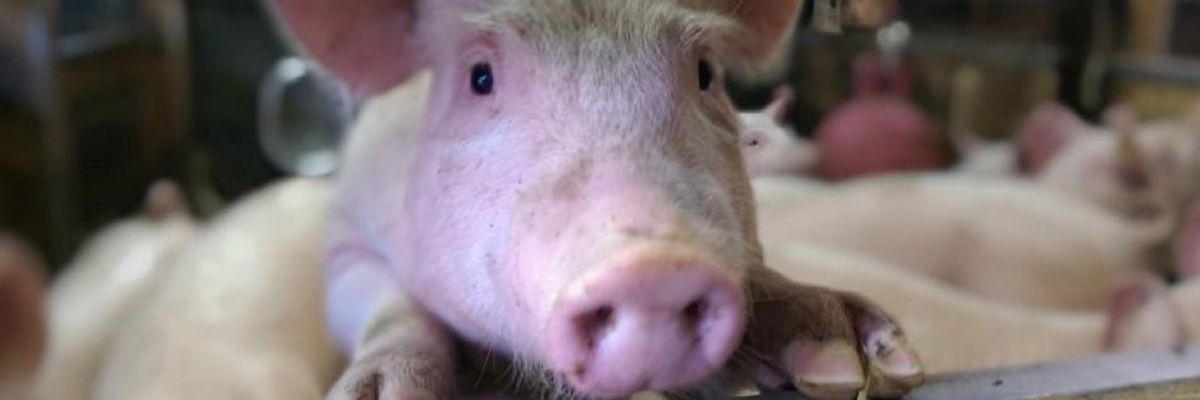Global investor network Farm Animal Investment Risk and Return said Wednesday that the novel coronavirus stands to be the "straw that breaks the meat industry's back" as the group released a new report warning that industrial meat production is fueling the risk of future zoonotic pandemics.
"Factory farming is both vulnerable to pandemics and guilty of creating them. It's a self-sabotaging cycle that destroys value and risks lives," Farm Animal Investment Risk and Return (FAIRR) founder Jeremy Coller said in a statement launching the new report, Infected Industry.
Using criteria including worker safety, deforestation, animal welfare, and antibiotic stewardship, researchers analyzed the biggest 60 global meat, fish, and dairy companies and found that 44 of them--73%--rated as "high-risk" in FAIRR's new Pandemic Ranking tool.
FAIRR also highlighted how the conditions animals face in industrial operations, like densely packed, poorly ventilated quarters, "create the perfect environment for deadly diseases to mutate and spread rapidly." Other factors contributing to industrial meat production's role in fostering possible future pandemics include humans destroying natural animal habitats to make way for more farms and the industry's heavy reliance upon treating animals with antibiotics--thus giving rise to antimicrobial resistance.
Maria Lettini, executive director of FAIRR, spoke about those conditions, explaing how factory farms are "incubators and reservoirs" of zoonotic diseases in a Wednesday interview with Euronews:
Casualties of the corporate profit-focused approach to animal agriculture in the midst of the ongoing Covid-19 pandemic have already been revealed.
With coronavirus outbreaks shutting down meat processing plants, millions of animals are being culled, often with cruel methods. And, as Animal Welfare Institute's farm animal program director Dena Jones recently noted, "plants that don't treat animals well often don't treat workers well."
Many already exploited meat plant workers are being forced to go to work despite the facilities becoming veritable Covid-19 hotspots. The Food & Environment Reporting Network also reported last week:
Ten of the 14 rural counties with the highest infection rates contain meatpacking plants with outbreaks. Of those 10, four of the outbreaks are located at Tyson Foods plants, two at National Beef plants, and one each at a Smithfield, Cargill, Seaboard Foods, and JBS plant. These companies are some of the biggest meat producers in the county. According to an analysis by FERN, Tyson Foods alone accounts for a third of all Covid-19 cases among meatpacking workers nationally.
"Meat processing finds itself at the centre of the pandemic with over 20,000 workers in the U.S. alone having already contracted Covid-19," said Peter van der Werf, senior engagement specialist, at asset manager Robeco.
The bottom line for meat giants is taking a hit too. Jeff Currie, head of commodities research at Goldman Sachs, said last month that the only other commodity market "looking as precarious as oil" was livestock--a datapoint contributing to some food system analysts' suggestion that the coronavirus appears to be helping sound the death knell for factory farming.
As FAIRR's Coller explained, the changes that should be put in place by the industry to avoid future disease outbreaks--like better approaches to animal health--just don't line up with its modus operandi.
"To avoid causing the next pandemic, the meat industry must tackle lax safety standards for food and workers alike, closely confined animals and overused antibiotics," said Coller. "This will disrupt a supply chain already cracking from fundamental land, water, and emissions constraints."
To achieve better resilience in the face external shocks, the new research suggests investing in plant-based proteins--and the market shows a rowing appetite for such products.
Sen. Cory Booker (D-N.J), who introduced in December a new agricultural reform bill that includes a proposed national moratorium on factory farms, said last month that it's time for agribusiness behemoths' control over the food system to end.
"Our food system was not broken by the pandemic and it was not broken by independent family farmers," said Booker. "It was broken by large, multinational corporations like Tyson, Smithfield, and JBS that, because of their buying power and size, have undue influence over the marketplace and over public policy. That undue influence was on full display with President Trump's recent executive order prioritizing meatpacker profits over the health and safety of workers."
"We need to fix this broken system," Booker continued. "That means protecting family farmers and food system workers and holding corporate integrators responsible for the harm they are causing. Large factory farms are harmful to rural communities, public health, and the environment and we must immediately begin to transition to a more sustainable and humane system."
FAIRR's new report also comes a day after renowned primatologist and conservationist Jane Goodall continued her calls for food systems to move away from factory farming.
"Our disrespect for wild animals and our disrespect for farmed animals has created this situation where disease can spill over to infect human beings," she said.

